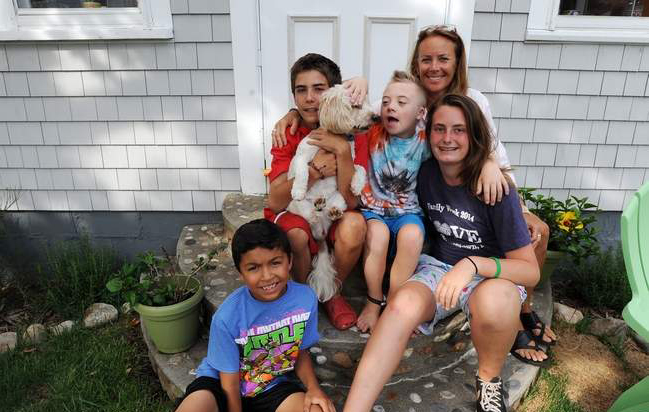Single mom adopts 6 kids from foster care

Kachtick-Anders, 52, is a mom to seven children. She adopted six of them and gave birth to Wyatt, who has Down syndrome and attention deficit hyperactivity disorder.
Almost all have been born with challenges that would be daunting for any parent. But Kachtick-Anders chose to take them on, over and over again.
“You are not too old, too poor, or too gay to adopt,” Kachtick-Anders said during a presentation on adoption at the Unitarian Universalist Meeting House in Provincetown earlier this year.
Or too busy, apparently. Kachtick-Anders won a write-in election to the Provincetown School Committee this spring.
“To be fair, it’s not like I’m some kind of saint,” Kachtick-Anders said. “I didn’t know they would have special needs at first, they were just kids. And then after a while, it seemed like it was just meant to be. And then when I birthed a child with special needs, it just seemed more like that.”
Photographs of all her children are displayed on a wall in the hallway. Kachtick-Anders walks over and the introductions begin.
She points to a photo of Clarence, 24, who Kachtick-Anders adopted when he was 5 years old. He has severe mental illness and lives on the streets in Texas.
Her second child, Atrayue, 20, has had problems with the law and lives in New York.
The third, Desi, 21, lived in 13 foster and family homes before coming to Kachtick-Anders’ house. She now lives in Texas with her 2-year-old son.
Number four, Archie, 15, looks younger than his age and has iridescent hazel eyes. He’s sweet, sensitive and has autism, she said.
Next is 13-year-old Savana, who is entering Nauset Regional High School this fall. Tall for her age, she wants to be a teacher, a lawyer, or an architect. She doesn’t really know.
“But I know I’m going to college,” she said.
Savana is the only “typically developed,” child in the home, Kachtick-Anders said.
Like all of the adopted children, Savana was exposed to drugs or alcohol in the womb. But she shows no apparent effects.
Later, when all the children are home and playing outside, Wyatt becomes grouchy. Savana hugs him and puts him on her lap. His mood changes fast.
“I have to be careful not to allow (Savana) to be a caregiver and give her attention,” Kachtick-Anders said.
Then there is the littlest, Andres, 8, who is actually Desi, Clarence and Atrayue’s nephew. Their oldest sister is his birth mother.
Andres said he remembers getting off the plane to join his new family. At age 4, he traveled with an escort from a foster home in Seattle to join Kachtick-Anders and his six new siblings in Nyack, New York, where she lived before moving the family to Provincetown. When asked about Kachtick-Anders, Andres smiles, slaps her playfully and says, “She’s nice.”
In order to prevent attachment problems, Kachtick-Anders worked hard to establish a primary care bond with the 4-year-old, cutting his food, and feeding him from a bottle in the beginning. Kachtick-Anders said she read a lot about the best way to establish a connection. Although Andres has ADHD, he is other otherwise doing well, she said.
“Every parent deals with something,” she said. “My somethings are just different.”
When Kachtick-Anders started fostering in Seattle, “I thought if you love them and take them to the park to play they will be OK,” she said.
She soon learned the trauma children face after being bounced around from one caretaker to another, and being neglected by one or more of them. Fetal alcohol syndrome and drug exposures may have led to most of her children having ADHD. The mental health and behavior problems of her older children may have come from inherited disorders, low self-esteem, drug exposure in the womb, the trauma of their early upbringing or a combination.
But whatever happened to them, they are still kids. And once she started adopting, Kachtick-Anders found she wanted more.
Even when her own son was born with Down syndrome, she still “had room” for Andres, she said. And her house may not be too full yet, she added.
“They are funny, smart and silly,” Kachtick-Anders said of her children. “It’s fun chaos. You have to use your brain just to go to the grocery store sometimes. Sometimes it’s just comical.”
via Cape Cod Times
photo: Merrily Cassidy/Cape Cod Times

